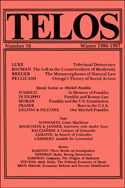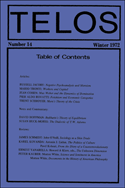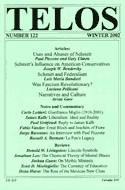What happened in Cologne on New Year’s Eve is taking place now, at this very moment and as a matter of course, in broad daylight a hundred thousand times in North Africa and the Arab world: women are being sexually assaulted, humiliated, and, if they resist the attacks, denounced as “sluts” or “whores.” The Egyptian author and feminist Mona Eltahawy described this phenomenon and its causes on May 2, 2012, in s Slate.fr article: “Well, they [the men of the Arab world] hate us. It has to be finally said. . . . Women in the whole world have problems; it is true that the United States has not yet elected a woman president; and it is true that in many Western countries (I live in one of them), women are still treated like objects. That is the point where the conversation usually ends, if you try to discuss the reasons why Arab societies hate women. Name any Arab country, and I will give you a litany of examples for the bad treatment—it is a thousand times worse than you think—of women, which derives from a poisonous mixture of culture and religion that evidently only very few people are willing to address, out of fear of being accused of blasphemy or shock.”
|
“I believe we have committed heinous and horrific crimes. We were involved with espionage, treason, and disobedience. Our crimes are too grave, so much so that the Islamic Republic of Iran should mete out the severest and heaviest punishment upon us who are responsible for all these transgressions.” This quote is taken from the televised confession of Dr. Noureddin Kianouri in 1981. Kianouri was the General Secretary of the Toudeh party, Iran’s communist party, from 1979 to 1984. While he appeared ragged, fragile, devastated, and impatient, and could hardly compose complete sentences in Farsi, clearly due to tough and cruel torture, he was displayed on national television in order to tarnish his record and the image of the Toudeh party at large. The once prominent politician was shattered by this forced interview in which he, next to other leaders of Toudeh, was forced into reciting and restating whatever their interrogators and torturers put in front of them. The recent protests of the deaths of Michael Brown in Ferguson, Missouri, and Eric Garner in New York City, both black males, at the hands of police, ignited what some believe to be a new movement in the vein of the historic black Civil Rights Movement of the 1960s. Little did Messrs. Brown and Garner know that their tragic deaths would breathe new life into a near-dead progressive Left. New groupings of Gen Xers and Millennials, networking through the Internet, have now displaced older activist groups led by the Rev. Jesse Jackson and the Rev. Al Sharpton. Other groups, like organized labor (especially SEIU), and perennial malcontents of Marxian legacy, such as the ANSWER coalition and the Revolutionary Communist Party, USA, have appeared in protests, alongside shadowy cadres of white anarchists, who in some cities have thrown firebombs and damaged property during protest actions. Unlike Occupy Wall Street and its derivatives, the new protest groups have an identifiable leadership, appear regularly in news media, and are building the road as they travel, that is, working out tactics and strategies based on their reading (or misreading) of past protest movements, as they go. |
||||
|
Telos Press Publishing · PO Box 811 · Candor, NY 13743 · Phone: 212-228-6479 Privacy Policy · Data Protection Copyright © 2025 Telos Press Publishing · All Rights Reserved |
||||
 Premised on the Left’s fundamental inability to dissociate itself from the ideals of the bourgeois revolution, Zygmunt Bauman’s “The Left as the Counter-Culture of Modernity” introduces the notion of reconstituting “the Left as the counter-culture of modernism,” rather than as the “counter-culture of capitalism.” Bauman makes the case for this repositioning because, in his view, there is no historical agent to carry out an anti-capitalist program. However, by continuing to defend and maintain the Left’s core values of individual autonomy and political democracy, Bauman believes that the Left can identify the barriers preventing their realization in the present neoliberal paradigm. Bauman recounts the Left’s courtship with various strategies, namely, the heterodox critique of capitalist practice and professed affinity with the industrial working class, and the recent flirtation with postmodern theory. By examining each as it addresses the present historical paradigm, he emphasizes the need to rehabilitate the values of the Leftist program and search for alternative strategies to realize them.
Premised on the Left’s fundamental inability to dissociate itself from the ideals of the bourgeois revolution, Zygmunt Bauman’s “The Left as the Counter-Culture of Modernity” introduces the notion of reconstituting “the Left as the counter-culture of modernism,” rather than as the “counter-culture of capitalism.” Bauman makes the case for this repositioning because, in his view, there is no historical agent to carry out an anti-capitalist program. However, by continuing to defend and maintain the Left’s core values of individual autonomy and political democracy, Bauman believes that the Left can identify the barriers preventing their realization in the present neoliberal paradigm. Bauman recounts the Left’s courtship with various strategies, namely, the heterodox critique of capitalist practice and professed affinity with the industrial working class, and the recent flirtation with postmodern theory. By examining each as it addresses the present historical paradigm, he emphasizes the need to rehabilitate the values of the Leftist program and search for alternative strategies to realize them.  Mario Tronti’s postscript to the second edition of his publication Operai e Capitale, published in Telos in 1972 as “Workers and Capital,” provides the reader with a summation of his thought on the development of the “mass worker,” presented through an analysis of notable labor struggles across the Western world. Tronti’s methodology, which he briefly explicates at the beginning of the piece, delineates certain historical workers’ struggles in order to examine “macroscopic groups of facts yet untouched by the critical consciousness of labor thought” (25). His purpose is to yield “an historical model, a privileged period of research” (25) so as to better analyze the emergence of the autonomy of the working class engaged in a dialectical struggle with capital.
Mario Tronti’s postscript to the second edition of his publication Operai e Capitale, published in Telos in 1972 as “Workers and Capital,” provides the reader with a summation of his thought on the development of the “mass worker,” presented through an analysis of notable labor struggles across the Western world. Tronti’s methodology, which he briefly explicates at the beginning of the piece, delineates certain historical workers’ struggles in order to examine “macroscopic groups of facts yet untouched by the critical consciousness of labor thought” (25). His purpose is to yield “an historical model, a privileged period of research” (25) so as to better analyze the emergence of the autonomy of the working class engaged in a dialectical struggle with capital.  Like Spinoza, many liberal thinkers have defined the liberty they promote in terms of the necessity of submitting to the law that guarantees it. This is a unique kind of rule of law, a rule of the “‘politically correct,’ universalist, managerial-liberal” (9) law of contemporary liberals. Both internationally and domestically, this law requires the muscular imposition of questionable political, moral, and economic principles, by means of an insidious and often nauseating bureaucratic, technocratic, mediacratic apparatus, onto largely unwilling publics. Crucially, the freedom championed by such liberals and allegedly secured by their law does not include the freedom to refuse their domination root and branch.
Like Spinoza, many liberal thinkers have defined the liberty they promote in terms of the necessity of submitting to the law that guarantees it. This is a unique kind of rule of law, a rule of the “‘politically correct,’ universalist, managerial-liberal” (9) law of contemporary liberals. Both internationally and domestically, this law requires the muscular imposition of questionable political, moral, and economic principles, by means of an insidious and often nauseating bureaucratic, technocratic, mediacratic apparatus, onto largely unwilling publics. Crucially, the freedom championed by such liberals and allegedly secured by their law does not include the freedom to refuse their domination root and branch. 

